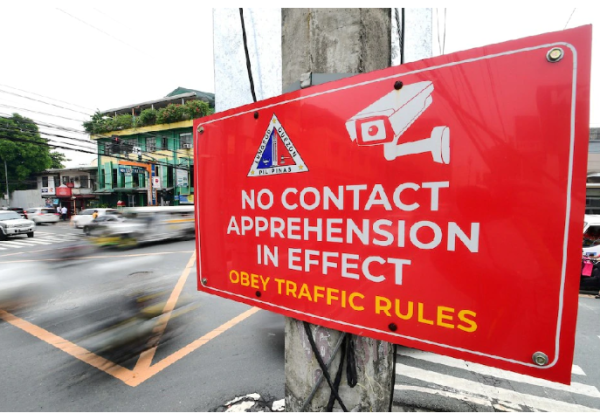[12.7] 솔젠은 NCAP을 방어합니다. 공공 도로에서 차량 사용은 권리가 아니라 특권이라고 합니다.
컨텐츠 정보
- 20,863 조회
본문
"게바라", TRO 해제 요구
MANILA — 공공 도로에서의 차량 사용은 규제 대상이 될 수 있는 "특권에 지나지 않는다"고 법무장관 "Menardo Guevarra"는 화요일 일부 메트로의 "신체적 접촉 금지 정책"(NCAP)을 정당화하면서 말했습니다. 마닐라 지방 정부 단위(LGU).
"게바라"는 발렌수엘라, 파라냐케, 문틴루파, 케손시티, 마닐라의 조례를 옹호하여 교통 단속원이 폐쇄 회로 텔레비전(CCTV) 카메라를 사용하여 교통 위반자를 체포하고 캡처한 이미지에 따라 벌금을 부과하도록 허용했습니다.
3개 그룹의 청원인은 대법원에서 이러한 조치에 대해 이의를 제기했으며 무엇보다도 적법 절차 및 프라이버시에 대한 헌법상의 권리를 침해했다고 주장했습니다.
게바라: 청원인은 NCAP 조례에 이의를 제기할 자격이 없습니다.
"Guevarra"는 권리가 없거나 해당 권리에 대한 명확한 실제적 또는 위협적 피해가 없는 경우, SC가 할 수 있기 전에 주요 요구 사항인 고등 법원에 청원서를 제출할 수 있는지 여부를 질문했습니다. 이전에 제출된 청원을 받아들입니다.
그는 MMDA 대 "Garin"의 2015년 SC 사건을 인용하면서 존재하지 않는 권리에 대한 침해가 있을 수 없다고 말했습니다.
“[자동차]는 잠재적인 위험의 도구입니다… 공공 장소에서 자동차를 운행할 권리는 자연스럽고 무제한적인 권리가 아니라 공공의 안전과 복지를 위해 경찰권 하에서 합리적인 규제를 받는 특권입니다. . 면허 권한은 규정된 조건을 준수하지 않을 경우 해당 면허를 보류하거나 취소할 수 있는 추가 권한을 가져옵니다.” "Guevarra"가 SC 치안 판사에게 말했습니다.
그는 첫 번째 청원인 그룹인 KAPIT, PASANG MASDA, ALTODAP 및 ACTO가 부상을 주장하지 않은 반면 두 번째 청원인인 "Juman Paa" 변호사의 부상은 자신의 위반으로 인한 것이라고 지적했습니다. 교통 규칙.
"Paa"는 자신의 차가 교통 조례를 4번 위반하다 적발된 후 추가 요금과 이자를 포함하여 PHP 20,000 이상의 벌금을 마닐라 교통 주차국에 지불해야 한다고 말했습니다.
"일반적으로 '적용된' 정부 행위에 대한 헌법적 도전은 도전자의 권리를 침해했다는 주장이 있는 경우에만 허용됩니다." "게바라"가 말했습니다. "이 규칙은 법원에 출석하지 않고 제3자의 권리 침해만을 근거로 법령의 합헌성에 이의를 제기하는 것을 금지합니다."
"Guevarra"는 청원인들이 대법원에 직접 청원서를 제출했을 때 행정적 구제책을 소진하지 못했고 법원의 위계질서에 관한 원칙을 위반했다고 주장했습니다.
그는 GIOS-Samar 대 DOTC의 2019년 SC 사건에서 상고인이 주장한 위반 혐의와 같은 사실적 문제가 관련된 경우 고등법원에 직접 제기된 사건을 대법원이 더 이상 받아들이지 않을 것이라고 지적했습니다.
"Paa"는 공적 자금이 NCAP의 실행에 관여한다고 말하면서 법원 앞에서 이 문제의 초월적 중요성을 강조했습니다.
그는 또한 이 사건에서 시간이 가장 중요하다고 말함으로써 곧바로 대법원으로 가는 것을 정당화했습니다. 해제될 때까지 유효합니다.
SC는 8월에 NCAP에 대한 TRO를 발행했으며 현재까지 그대로 유지되고 있습니다.
"게바라"는 고등법원에 명령을 재고할 것을 요청했지만 "알렉산더 게스문도" 대법원장은 대신 법원이 문제를 재검토할 수 있도록 5일 이내에 추가 문서를 제출하라고 당사자들에게 명령했습니다.
"GUEVARRA": 적법 절차 위반 금지
"Guevarra"는 NCAP 조례가 1991년 지방정부법의 일반 복지 조항에 따라 허용되는 지방정부에 대한 경찰 권한의 유효한 위임으로 간주될 수 있다고 설명하면서 NCAP 조례의 타당성을 옹호했습니다.
NCAP를 시행하는 메트로폴리탄 마닐라 개발청의 자체 결의안은 고등법원에서 지지를 받았다고 그는 말했습니다.
청원인이 제기한 주요 문제는 적법 절차에 대한 권리를 침해했다는 주장입니다.
교통 단체들은 조례가 교통 집행관이 위반한 것으로 주장되는 육상 교통 및 교통법(RA 4136)의 특정 조항을 언급하지 않고 운전자를 체포할 수 있도록 허용할 것이라고 주장했습니다.
그들은 벌금이 운전자 자신이 아닌 등록된 차량 소유자에게 부과되기 때문에 편견을 갖게 될 것이라고 덧붙였다.
세 번째 청원인인 필리핀 국영택시사업자 측을 변호하는 변호사 '로먼 아루가이'의 경우, 사실상 무죄 입증 책임이 등록된 소유자의 책임을 입증하는 고소인보다 등록된 차량 소유자에게 전가되는 상황이 벌어지고 있다. 교통 위반.
그는 인용에 대한 이의를 제출하지 않은 것이 왜 인정으로 취급되는지 의문을 제기했습니다.
"Paa"는 위반 통지가 잘못된 주소로 발송되었기 때문에 자신이 차를 운전하는 사람인지 기억할 수 있는 합리적인 시간 내에 교통 소환장에 이의를 제기할 수 없다고 말했습니다.
그는 미납에 대한 할증료와 이자가 발생한 지 1년이 지나서야 교통 위반 딱지를 알게 되었다고 말했다.
그는 통지의 부재를 해결할 수 있는 수단이 없다는 것은 적법 절차에 대한 그의 권리를 또 다른 위반이라고 말했습니다.
그러나 "게바라"는 등록된 차량 소유자에게 책임을 귀속시키는 규칙의 적용이 사고 및 피해 복구와 관련된 경우뿐만 아니라 잘 확립되어 있다고 말했습니다.
“NCAP 조례는 법 위반자를 식별하고 발견하는 수단으로 등록된 차량 소유자의 통지를 정확하게 요구합니다. 이 조례는 등록된 차량 소유자가 자신의 추정 책임에 이의를 제기하고 해당되는 경우 교통 위반을 저지른 차량의 실제 운전자를 식별하는 증거를 제시할 수 있도록 통지하도록 의무화합니다.”라고 그는 설명했습니다.
"이 메커니즘은 통지를 받은 당사자에게 적법 절차 권리를 제공할 뿐만 아니라 등록된 소유자 규칙이 수립된 목적을 구현합니다."라고 덧붙였습니다.
게바라: 프라이버시 권리 침해 금지
'게바라'도 사생활 침해라는 청원인들의 주장을 받아들이지 않았다.
"Paa"는 NCAP을 구현하기 위해 운전자의 개인 정보를 공유하는 LGU와 육상 교통국의 계약에 의문을 제기했습니다.
그는 그러한 합의가 NCAP 프로그램을 운영하기 위해 LGU가 고용한 민간 서비스 계약자에게까지 확대되어서는 안 된다고 말했습니다.
Paa는 마닐라 LGU 웹사이트에서 단순히 차량 번호판을 입력하는 것만으로 자신의 민감한 개인 정보가 자신의 동의 없이 대중에게 공개되었다고 주장했습니다.
그러나 Guevarra에게는 프라이버시 권리 침해가 없습니다.
그는 “LTO가 차량 등록 데이터를 지방 정부와 공유하는 것은 공공 기관의 기능을 수행하는 데 필요한 정보를 포함한다”고 말했다. "따라서 데이터 개인 정보 보호법의 적용 범위에서 명시적으로 제외되는 개인 정보 공유입니다."라고 그는 말했습니다.
그는 NCAP 카메라는 운전자의 이미지가 아니라 교통 법규를 위반하는 차량의 이미지를 캡처한다고 덧붙였다.
“게다가 청원인들은 공공 도로에서 공개적으로 차량을 사용할 수 있는 특권을 행사하면서 프라이버시에 대한 기대치를 확립하지 않았습니다.”라고 그는 말했습니다.
사생활 침해 사건에서 법원은 개인이 사생활에 대한 합당한 기대를 보였는지, 그리고 그 기대가 정부 침입에 의해 침해되었는지 여부를 확인합니다.
청원인이 제기한 또 다른 요점은 정부가 아직 해결하지 못한 것으로 신체 체포를 채택하는 조례에 비해 NCAP에 따라 부과되는 엄청난 수수료입니다.
한편 게바라는 운송 그룹의 변호인 말콤 로(Malcolm Law)가 마카티 법원이 NCAP에 의문을 제기하기 전에 계류 중인 청원을 공개하지 않았다고 비난했습니다.
변호사 "Greg Pua, Jr." 말콤 법무부는 두 사건 사이에 유사한 당사자가 없었기 때문에 포럼 쇼핑에 대한 인증에서 공개를 요구하는 규칙을 위반하지 않았다고 말했습니다. RTC에 계류 중인 청원은 그의 의뢰인이 아니라 그의 로펌인 말콤 로(MALCOLM Law)라고 그는 말했다.
게바라: NCAP 필요
NCAP를 구하기 위한 노력에서 "Guevarra"는 이를 해결하기 위한 "혁신적인" 방법으로 메트로 마닐라와 NCAP의 악화되는 교통 상황을 언급했습니다.
그는 메트로 마닐라의 평균 이동 속도가 2013년 시속 32.86km에서 2019년 시속 23.38km로 떨어졌고, 차량 수는 2002년 137만 대에서 2022년 10월 현재 312만 대로 증가했다고 말했다.
교통 체증도 2002년 162,364건에서 2019년 대유행 이전 250,767건으로 증가했습니다.
그러나 NCAP의 시행으로 LGU는 마닐라에서 95%, 발렌수엘라에서 82%, 파라냐케에서 84%, 케손시티에서 75%까지 일일 교통 위반 건수가 감소한 것으로 추정됩니다. 게바라.
NCAP는 또한 마닐라에서 위반자의 79%가 반복 위반자이기 때문에 징계를 가르치는 것으로 추정됩니다.
그러나 "Guevarra"에 따르면 이러한 이득은 TRO가 발행되었을 때 역전되었습니다.
"따라서 우리는 특히 정부가 대유행으로 황폐화된 우리 경제를 재활성화하는 어려운 과업에 착수한 이 시점에서 이 최고 법원이 NCAP의 재실행을 승인하기를 기도합니다."라고 그는 말했습니다.
그러나 자신의 권리 침해 혐의에 대해 확고한 태도를 유지한 청원인에게 목적은 수단을 정당화하지 않습니다.
"피고인은 신체 접촉 체포 또는 NCAP가 효과적인 교통 규제가 아니며 다른 유익한 효과 중에서도 교통량을 줄였다는 것을 명예 법원에 확신시키기 위해 사실, 통계 및 데이터를 제시할 것입니다." "Pua," 말했다.
“그러나 청원인들은 NCAP의 어떠한 이익도 헌법 및 기존 법령에 대한 특허 침해를 정당화하지 않으며 정당화해서는 안 된다고 강조합니다.”라고 그는 덧붙였습니다.
NCAP 구두 주장은 2023년 1월 24일에 계속될 예정이며, Dimaampao는 법무차관을 질의할 것으로 예상됩니다.
This is the Original Article from ABS-CBN NEWS
[12.7] SolGen defends NCAP. On public roads, the use of vehicles is said to be a privilege, not a right.
"Guevarra,' asks for lifting of TRO
MANILA — The use of vehicles on public roads is “nothing more than a privilege” that can be subject to regulation, Solicitor General "Menardo Guevarra," said on Tuesday in justifying the “no physical contact apprehension policy” (NCAP) of some Metro Manila local government units (LGUs).
"Guevarra," defended the ordinances of Valenzuela, Parañaque, Muntinlupa, Quezon City, and Manila which allowed traffic enforcers to apprehend traffic violators through the use of closed-circuit television (CCTV) cameras and impose fines based on the captured images.
Three groups of petitioners challenged these measures before the Supreme Court, claiming, among others, violations of their constitutional rights to due process and privacy.
GUEVARRA: PETITIONERS HAVE NO STANDING TO CHALLENGE NCAP ORDINANCES
"Guevarra," questioned whether they could even bring their petition before the high court in the first place in the absence of a right or of a clear actual or threatened injury of that right, a key requirement, according to him, before the SC can entertain petitions filed before it.
Citing the 2015 SC case of MMDA v. "Garin," he said there can be no violation of a right that does not exist.
“[M]otor vehicles are instruments of potential danger… The right to operate them in public places is not natural and unrestrained, but a privilege subject to reasonable regulation, under the police power, in the interest of public safety and welfare. The power to license imports further power to withhold or to revoke the such license upon noncompliance with prescribed conditions,” "Guevarra," told SC magistrates.
He pointed out that transport groups KAPIT, PASANG MASDA, ALTODAP, and ACTO, which comprise the first group of petitioners, failed to allege any injury while the claimed injury of the second petitioner, lawyer "Juman Paa," came from his violation of traffic rules.
"Paa," said he was constrained to pay more than PHP 20,000 in fines, including surcharges and interests, to the Manila Traffic and Parking Bureau after his car was caught four times violating a traffic ordinance.
“As a general rule, a constitutional challenge to a governmental act ‘as applied’ is permissible only upon the assertion of a violation of the challenger’s rights,” "Guevarra," said. “The rule prohibits one from challenging the constitutionality of the statute based solely on the violation of the rights of third persons not before the court.”
"Guevarra," claimed petitioners failed to exhaust administrative remedies and violated the doctrine on the hierarchy of courts when they filed their petition directly before the Supreme Court — a point SC Associate Justice "Japan Dimaampao," hammered on in his interpellation of the petitioners.
He pointed out that under the 2019 SC case of GIOS-Samar v. DOTC, the Supreme Court will no longer accept cases directly filed with the high court if there are factual issues involved, such as the alleged violations claimed by petitioners in the case.
"Paa," invoked the transcendental importance of the issue before the Court, saying public money is involved in the implementation of NCAP.
He also justified going straight to the Supreme Court by saying time is of the essence in the case -- a temporary restraining order (TRO) issued by a regional trial court will last only between 3 to 20 days while a TRO issued by the SC will remain effective until lifted.
The SC issued a TRO on NCAP in August, which has remained in place.
"Guevarra," asked the high court to reconsider the order but Chief Justice" Alexander Gesmundo" ordered the parties instead to submit additional documents within 5 days so the court can revisit the issue.
"GUEVARRA": NO VIOLATION OF DUE PROCESS
"Guevarra," defended the validity of the NCAP ordinances, explaining that they can be considered a valid delegation by the State of police power to local governments that are allowed under the general welfare clause of the Local Government Code of 1991.
The Metropolitan Manila Development Authority’s resolution implementing NCAP, he said, has been upheld by the high court.
A key issue raised by petitioners is the alleged violation of their right to due process.
Transport groups claimed the ordinances would allow traffic enforcers to apprehend motorists without citing which specific provision of the Land Transportation and Traffic Code (RA 4136) they allegedly violated.
관련자료
-
이전
-
다음


